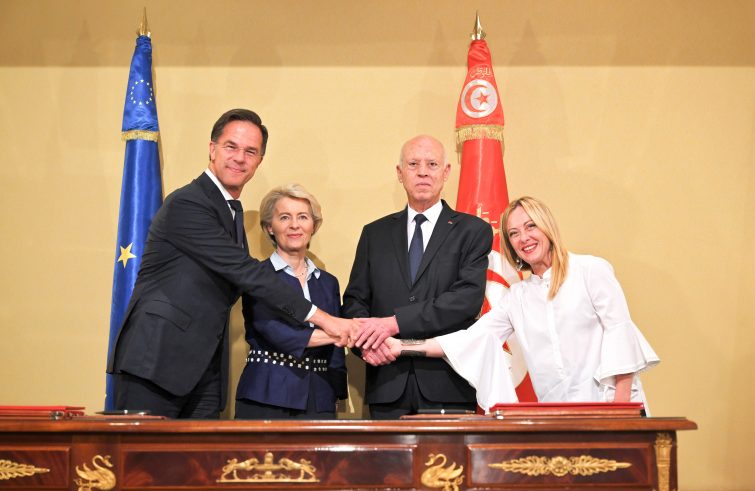
Geopolitics thrives on ‘memoranda’, ‘agreements’, ‘partnerships’ and even treaties. Right now, the EU is signing agreements with Latin American and Caribbean countries. Economic cooperation and trade, energy supplies and the fight against climate change, security and transport infrastructure are all being put on paper. Including education, research and culture. And migration (from a ‘prevention’ and ‘response’ perspective). Ursula von der Leyen, Giorgia Meloni, Mark Rutte, representing the EU, and Tunisia’s President Saied signed a memorandum of understanding on Sunday July 16, defined as a “global partnership”. It’s not the first of its kind and certainly won’t be the last. It covers five pillars: macroeconomic stability, trade and investment, green energy transition, people-to-people contacts (such as Tunisia’s participation in the Erasmus+ programme) and migration.
The EU has de facto pledged to provide Tunis with substantial economic aid, counting on having a reliable partner on the other side of the Mediterranean, capable, among other things, of halting or slowing down the flow of migrants.
It should be said that dialogue is a cornerstone of politics and diplomacy. Therefore, keeping a channel of dialogue and cooperation open with Tunisia is also crucial for European ‘interests’. Moreover, it cannot be ignored that today’s Tunisia is a country whose democratic system is in danger, and that Saied himself plays a key role in the country’s dangerous authoritarian drift. Human rights are a mirage in the North African country and there is no guarantee that migrants passing through will be treated humanely. These questions were also raised on Sunday and in the hours following the signing of the memorandum. Said does not seem to have any intention of pulling the EU’s migration chestnuts out of the fire. Indeed, he did not promise the Twenty-Seven (or Italy) much.
It is fair to say that the agreement with Tunis is a first step in the right direction. It could be replicated with other Mediterranean countries. But to expect significant or decisive outcomes seems risky, to put it mildly.
Moreover, there are two very European obstacles in the way. The first is that this agreement has to be ratified by the EU Council, which includes representatives of sovereignist countries that want little or nothing to do with ‘foreigners’, especially those from poor countries. The text signed by the trio could thus come to a standstill. The second, and probably more serious, obstacle is that in order to tackle the immigration phenomenon in a serious and concrete way, Europe must first of all agree to go beyond the Dublin Agreement and establish a genuine common immigration policy, based on the – sacrosanct – premise that this is a European problem that everyone should shoulder together in a climate of solidarity.
But solidarity – the founding principle of the European ‘common home’ – is out of fashion at this time in history.
If it were, it would have to be applied to many aspects of the EU’s present and future policies – taxation, economic and financial affairs, energy including health, justice, internal and external security. And so on.
Europe is the necessary area in which the countries of Europe can make their presence felt on the global stage. But Europe, dreamt and built by the “founding fathers” in a very different historical context, must change to keep up with the times. And just as many thoroughbred politicians are needed to plan and implement its future.











